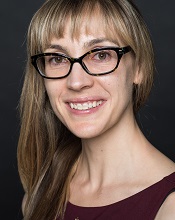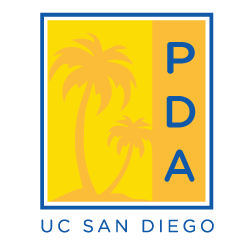
Sheila Rosenberg, Ph.D.
Principal Investigator and Assistant Director of Research | Casa Colina Hospital and Centers for Healthcare

- Interview Overview
Interview Overview
Interview and Editing by: Alexandra Bortnick
1. Please list your previous department at UC San Diego and provide a brief description of the research you conducted?
Before coming to Casa Colina, I was a postdoc in the Department of Bioengineering in the lab of Dr. Todd Coleman. . I was also lucky to have the opportunity to collaborate with UCSD clinicians included Dr. Sandy Ramos and Dr. MJ Harbert. My research focused on the optimization and potential use of epidermal electronic sensors to improve outcomes of newborn babies by conducting physiological maternal-fetal monitoring during labor and delivery and continuous monitoring of brain activity in newborns at-risk for brain injury. I was also working on predicting how perinatal and postnatal variables may impact the outcomes of newborn babies being treated for neonatal encephalopathy.
2. Please describe your current job profile?
At Casa Colina, I work on research related primarily to neurological injury and disease such as stroke, traumatic brain injury, spinal cord injury, movement disorders and autism. In my role as a principal investigator, I have the opportunity to design and conduct my own research studies, including the development and evaluation of novel therapeutic interventions. I also write grants to help fund my own research and other research projects that are being conducted in our department. As the Assistant Director of Research, I work alongside the Director of Research and we both oversee and run all of the studies that take place in our department. For the majority of the research I'm either conducting or overseeing, I work closely with clinicians and for some of my studies, I also interact with patients and their families. Part of my responsibility is to help train and education clinicians about the research process. I help them design studies and write and publish papers, and I do the statistical analysis of the data that they collect. I also have the opportunity to have a lot of undergraduate and graduate students working with me on my current research projects, so I'm also mentoring and training students. And I'm lucky to also have the opportunity to pursue collaborative research with industry and academic partners.
3. What made you decide to transition into your current position?
I was really lucky because I was informed about this opportunity through colleagues and invited to submit an application. I was really happy in San Diego and was fortunate to have received a UCSD Chancellor's Postdoctoral Fellowship so I wasn't planning to start my job search for at least another year. So it was a really tough decision- even to apply for the position. I think some of the best advice I was given about making the decision to transition was from many people-including my mentor Todd Coleman who basically told me that you can't predict when unexpected opportunities will arise, so you have to be willing to take them when they come along. This job seemed like it offered all of the elements of research that I thought I wanted and would enjoy: the chance to make decisions and conduct research as an independent investigator, the chance to do clinical research and statistical analysis and work closely with clinicians and patients, the chance to continue to collaborate with academic investigators, and the chance to mentor and train students. In addition, I was attracted to the position because we are very fortunate that Casa Colina has a Foundation that supports research-in terms of both infrastructure and financial support. So we don't have to depend solely on outside grant funding in order to conduct research.
4. Apart from the research you conducted, do you feel like anything in particular has helped you to acquire your current position?
I think being willing to continually pursue new interests and working to build a strong, supportive network of mentors and colleagues. My research on brain injuries in newborns sparked my interest in finding out what happens to those babies after they leave neonatal intensive care. I wanted to understand what kind of treatment is offered for neuro-rehabilitation, so I started volunteering in a Neuro Rehab Clinic at UCSD. I shadowed some fantastic physical therapists and met some great individuals receiving treatment, and learned a lot. Direct clinical exposure gave me lots of new ideas about research and what kind of interventions and research are really needed from a clinician and patient perspective. I talked about my experiences with people in my network, which is ultimately why I was invited to apply for my current position- I had a combination of research and clinical experience that made me an appropriate candidate. Once I started the application process, I was lucky to have incredible support from Dr. Coleman and the other students and postdocs in his lab, and Cat Printz and Carter McElroy (the UCSD Neuro-rehab physical therapists), who all spent a lot of time and gave me great advice on my job talk.
5. Please list some of the most striking similarities and differences between your postdoc and current position?
Similarities: Many of the goals and activities are the same: designing and conducting research studies, writing grant applications, publishing papers.
Differences: As researchers in a hospital, we are one part of a much bigger organization. I'm learning about some of the business side of medicine and running a hospital. I also see clinicians and patients and families frequently, so I'm aware of some of the medical challenges that people face and that clinicians try to help them overcome.
6. Is there any specific challenge (during the entire process of transitioning) that you would like to highlight and if so how did you overcome it?
One of the biggest challenges for me has been adjusting to managing and conducting many research studies at the same time. Its gotten easier, but I'm definitely still optimizing. I've learned a lot from talking to the Director of Research at Casa Colina and observing how she juggles everything. Recruiting and training a large team of students has helped me find ways to delegate and manage the workload. This has also created a new challenge of managing many people at once- at this particular moment, I have about 13 students that I advise and mentor. The best strategy I've found for this is to invest time in early training and get people as confident and independent as possible, enabling them to accomplish a lot. Another challenge is needing to learn many new things in a short amount of time. I think what helps the most with this is not being afraid to ask questions and being open to learning from anyone. I'm surrounded by some very talented and knowledgeable people here and I learn a ton from listening to their experiences in this setting. I also learn so much from talking to patients and their families.
7. Please describe your goals and ambitions for the next 5 years?
I would like to continue to grow as a colleague, mentor and researcher. I'd like to continue to expand and develop my statistical skill set- I think this is so important in a clinical research setting. I want to design and conduct studies that will help us better understand and better treat neurological disorders. I hope to have an impact on the quality of life of individuals who deal with these disorders. And I hope to continue to develop that elusive work-life balance :)
8. What do you feel you could have done more, as a postdoc, to help prepare you for or acquire your current position?
In hindsight, I would have spent more time asking more professors or senior level scientists in industry or clinical settings about their advice on managing multiple projects and multiple people and building collaborations, etc. I did some of that, and I'm learning as I go, but I think it never hurts to learn more about how other people do things and see what you like and can incorporate into your own career.
9. What do you feel is the most important advice you can give to a current UCSD postdoc in order for them to obtain a position such as yours?
Find a way to get exposure to what happens in a clinical setting. Interact with clinicians or with other researchers who work in clinical settings. Clinicians are busy in a totally different way than scientists and collaborating successfully with them requires understanding their time constraints and the fact that patient needs always come first. Try to get experience doing collaborative research if possible and working on interdisciplinary projects to get comfortable with having to communicate and work with people who speak different languages and have different skill sets. Try to get experience managing and mentoring other people. Network and communicate with as many people as you can because you never know who might know about a job or opportunity that might be a good fit for you!
